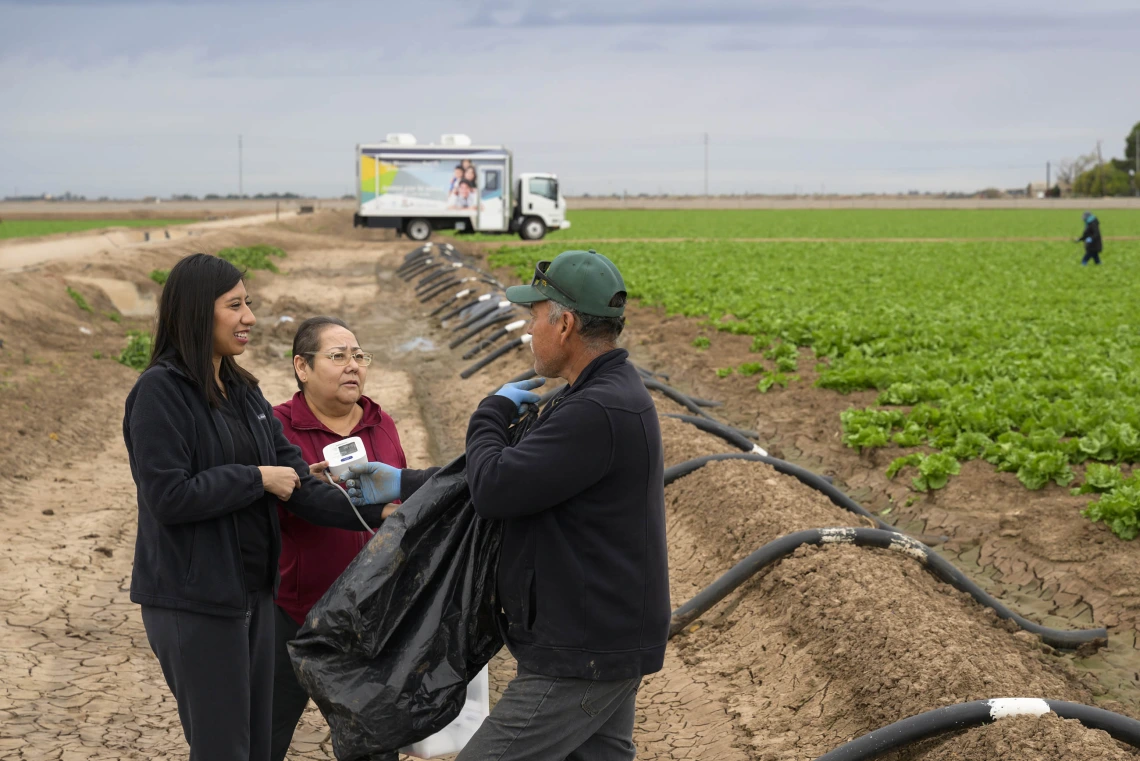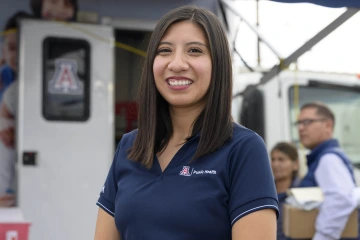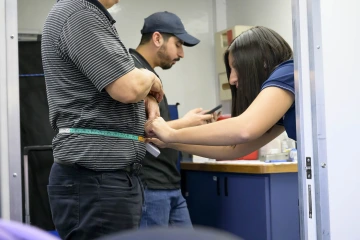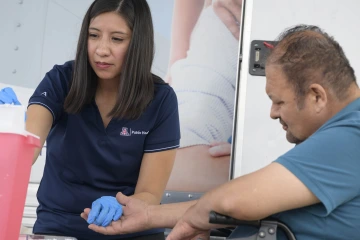Soto’s mission is improving well-being of migrant farmworkers
Public Health professor grew up working in the fields alongside her parents and now works to help people like them.

Sheila Soto, DrPH, MPH, left, and health educator Andrea Contreras, center, recently traveled to San Luis, Arizona, and talked to male farm workers about prostate cancer screenings. Soto was inspired by her parents, who are migrant farmworkers, to work in public health to make a difference in the lives of other farmworkers.
Every few minutes, Sheila Soto, DrPH, MPH, nervously glanced at the number of online observers logging in to watch her defend her dissertation. Once the audience hit 55, she quit looking. She didn’t want to get too nervous, especially since she knew her parents couldn’t be there with her. They were out harvesting onions and potatoes in the fields of Glenns Ferry, Idaho.

As a young child, Sheila Soto, DrPH, MPH, would sleep in her dad’s truck while her parents harvested produce in the fields of Glenns Ferry, Idaho.
Her parents, who still work in the fields picking produce, inspired her dissertation on the health of Arizona farmworkers.
“They start about 7 or 8 in the morning and their day won’t end until 7 or 8 at night,” said Soto, an assistant research professor in the University of Arizona Mel and Enid Zuckerman College of Public Health. “It’s very hard for me to hear about their long days because my parents are getting older. My dad is close to retirement age and my mom is, too. Unfortunately, the way things are, it’s going to be very hard for my parents to actually retire. It’s really sad.”
For Soto, who earned her doctorate in public health from UArizona in 2022, helping migrant farmworkers is personal.
Rising from the fields
Soto, the director of community engagement and outreach programs for the UArizona Zuckerman College of Public Health, is based at the Phoenix Bioscience Core but commutes from Tucson, where she lives with her three kids, ages 11, 7 and 6. She oversees the mobile health units and other community programs designed to reduce the number of people who rely on emergency room visits for their primary health care. The mobile health units provide services such as basic health screenings, education and referrals for the uninsured.
Her goal is to work with legislators to create policies that will improve farmworkers’ health and living conditions.
Soto, who started working at the university in 2017, said it was hard to juggle a full-time job, school and kids, but she willingly did it, knowing what her parents sacrificed for their children.
“Their work ethic is something that I share with my parents,” she said. “My dad takes his job very seriously. He does the best that he can, and so does my mom. I think that has also rubbed off on me and the work I do now. I love what I do. I think about everything my parents have gone through to live in the U.S. and when serving the community, and I see parts of my parents or grandparents in them.”
In search of a better life
When he was a teenager, Soto’s father and his siblings immigrated from Mexico before ending up in Idaho. While most people associate the state with potatoes, it’s a lush agricultural area perfect for a variety of produce. Soto and his siblings found plenty of work. Glenns Ferry is small and rural, with just a handful of other Latino farm-working families when she was growing up, Sheila Soto said.

Sheila Soto, DrPH, MPH, measures a man’s waist with a tape measure on a mobile health unit stop in San Luis, Arizona.
Soto, the third of four children, remembers sleeping in the back of her dad’s pickup truck until the rising sun would roust her. She’d wander into the fields, looking for her parents. On one occasion, a large, white bus lumbered past the farms, sending workers scattering into the tall weeds to hide from la migra, or immigration agents.
“Some of the families out there were undocumented and seeing them run and hide, that was very impactful, partially because I was really young and I didn't understand,” Soto said. “Later on, I realized people ran because if they were seen, it means they might be arrested and they’re not going to be able to be with their kids anymore.”
Though the work was hard, Soto wanted to help her family any way she could. So, she would harvest produce, too, hoping her parents might, at the very least, finish their days faster. She plucked mint and snipped grape bunches off the vine. She loved picking peaches because they were so plump and beautiful — a sweet, juicy finish to a long day’s work.
Her mom and dad went to as many school events and basketball games as they could, but their work meant they missed a lot when she was growing up. Soto understood why.
“My mom would always tell us, ‘We don’t want you guys to be in the field. We need you to go to school, to do the best that you can,’” Soto said.
“It makes me proud to be in public health because I can see the passion that they have for serving their community.”
Sheila Soto, DrPH, MPH
She took those words to heart. In high school, Soto joined as many extracurricular clubs as possible, serving as president or vice president and volunteering because she knew that was the key out of farm work. She became a Gates Millennium Scholar and studied architecture at the University of Idaho. She dreamed of designing community centers for rural areas.
Changing course
In her sophomore year of college, Soto discovered she was pregnant. It was a life-changing event that could have derailed her from finishing school, but instead she changed her focus by switching her major to sociology and ethnic studies.
Soto became interested in migration and the Deferred Action for Childhood Arrivals movement. Since she was a U.S. citizen, she ended up being a representative and voice for DACA students. She traveled to Washington, D.C., with her baby in tow, to speak to legislators. That sparked her interest in advocating for immigrant workers like her parents.

Sheila Soto, DrPh, MPH, says two of her kids are already talking about following in her footsteps and working in public health. Here, she helps a man outside a mobile health unit in San Luis, Arizona.
Navigating college and postgraduate education can be a tall task, especially for a first-generation student like Soto. Luckily, she said, she found strong mentors in Jill Guernsey de Zapien, health program director for the Health Promotion Sciences Department in the Zuckerman College of Public Health, and Cecilia Rosales, MD, MS, who recently retired as associate dean and professor in the Zuckerman College of Public Health in Phoenix.
“It makes me proud to be in public health because I can see the passion that they have for serving their community, and I really hope that I will eventually continue to do that with my career, too,” Soto said.
She remembers touring the UArizona campus and de Zapien pulling her aside and telling her she could make a difference here. Soto’s lived experience and passion stood out, said de Zapien, who counseled Soto through some rough patches, lifting her spirits when Soto felt overwhelmed.
“I can't tell you how many tears people shed when she defended her dissertation,” de Zapien said. “Such perseverance and persistence … I was incredibly amazed.”
De Zapien said Soto is a natural leader who knows how to foster collaboration and has a clear vision for her goals.
“She's constantly trying to figure out how the work she's doing can be relevant, not 10 years from now but how it can be relevant tomorrow in improving the lives of farmworkers,” she said.
Just as Soto went to work with her parents, her kids have grown up going to work with her. De Zapien said she marveled at how naturally Soto wove together her personal and professional lives — because it is natural.
“It’s important for my kids to see what I do just like it was important for me to see what my parents did,” she said.
Soto grins broadly when she talks about how her children are already planning their futures. The difference is, their dreams are the result of their exposure to the campus. While her parents’ American dream was simply to not have their kids laboring in fields, Soto’s kids plan on college and are aiming higher.
“When I was little, I wasn’t thinking about what career I would have,” she said. “They say they want to be a lawyer and public health doctors. That’s really awesome to hear them say that.”

